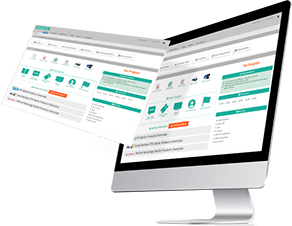The 2026 tax season approaches quickly, and smart tax professionals know that early preparation makes the difference between success and chaos. Tax season preparation isn’t just about updating software—it’s about creating systems that help you serve more clients efficiently while reducing stress and maximizing profits.
This complete professional checklist covers everything you need for successful 2026 tax season preparation. From state deadline variations to e-filing requirements, we’ll help you prepare systematically and professionally.
Tax Software and Technology Setup
Choose the Right Tax Preparation Software
Your tax software choice affects every aspect of your practice. Professional tax preparers need reliable software that handles all return types, includes comprehensive state coverage, and provides unlimited e-filing without hidden fees. Modern tax preparation requires software that grows with your practice. Whether you’re processing 50 returns or 5,000 returns annually, your software should support your volume without charging per-return fees that eat into your profits. Update your tax software by December 2025. Most professional software providers release 2026 versions in late November or early December. These updates include all tax law changes, new forms, and enhanced features that improve efficiency during busy season. Test your software thoroughly with different return scenarios. Run sample individual returns, business filings, and multi-state situations to ensure everything works properly. Don’t wait until January to discover compatibility issues or missing features.
Verify E-Filing Requirements
E-filing capability is mandatory for professional tax preparers. Your Electronic Filing Identification Number (EFIN) must be current and properly configured in your tax software before tax season begins. Contact the IRS by December 2025 to verify your EFIN status. Update any changes to your business address, phone number, or authorized personnel. Outdated EFIN information can suspend your e-filing privileges during peak season. Test your e-filing system using your software’s test environment. Run complete filing tests for different return types and state combinations. Verify that your internet connection can handle multiple simultaneous transmissions during busy periods. Critical E-Filing Checklist: • EFIN status verified and updated with current business information • Tax software configured and tested with your EFIN credentials • Internet connection speed tested for peak-volume transmission capacity • Backup internet connection established for redundancy • E-filing error handling procedures documented and tested
Client Communication Strategy
Develop Early Outreach Plans
Successful tax season preparation starts with proactive client communication. Early outreach maintains relationships, sets expectations, and creates opportunities to expand services before competitors reach your clients. Launch your client communication campaign by December 1st. Send personalized messages that address each client’s specific needs. Business clients need different information than individual filers, and returning clients require different messaging than new prospects. Create a communication calendar that extends from December through April. Include appointment booking windows, document collection deadlines, fee announcements, and tax deadline reminders. Consistent communication demonstrates professionalism and helps clients plan ahead.
Implement Document Collection Systems
Efficient document collection streamlines your entire preparation process. Establish secure systems for clients to submit tax documents completely and on time. Poor document collection creates bottlenecks that slow down your entire operation. Create comprehensive document checklists for different client types. Individual clients need W-2s, 1099s, and deduction records. Business clients require profit and loss statements, depreciation schedules, and quarterly payment documentation. Offer multiple document submission options to accommodate different client preferences. Secure online portals work well for tech-savvy clients, while traditional paper submission may be necessary for others. Flexibility improves client satisfaction and completion rates.
State-Specific Deadline Management
Understand State Filing Variations
Most states follow the federal April 15 deadline, but important variations exist. Louisiana maintains a May 15 deadline for individual returns, providing extra time that benefits both preparers and clients with complex situations. Several states regularly implement disaster-related extensions. Gulf Coast states frequently receive hurricane relief, while Western states may get wildfire extensions. California, Texas, and Florida preparers must monitor IRS disaster declarations that affect specific counties or regions. Multi-state clients create additional complexity. Part-year residents need careful attention to state income allocation rules and residency requirements. Business entities operating across states face nexus requirements and varying apportionment formulas. UltimateTax’s comprehensive pricing structure includes all state returns without additional charges, eliminating uncertainty and extra costs for multi-state practice management.
Plan for Multi-State Scenarios
Multi-state tax preparation requires specialized knowledge and reliable software support. Clients who moved during the year, work across state lines, or own multi-state businesses need expert guidance and comprehensive software capabilities. Develop expertise in common multi-state combinations in your area. Northeast practitioners often handle New York-New Jersey-Connecticut situations, while Southeast practitioners manage Florida-Georgia-Carolina combinations. Specialized knowledge differentiates your practice and improves efficiency. Professional tax software that includes comprehensive state coverage becomes essential for multi-state practice success. Additional per-state fees can quickly eliminate profit margins on complex returns.
Staff Training and Workflow Optimization
Prepare Your Team for Success
Tax season success depends on well-trained, efficiently organized staff. Begin training by late December, focusing on tax law changes, software updates, and improved procedures that enhance productivity during busy periods.
Essential 2026 Training Topics: • Updated tax law changes and practical applications for common client situations
• New state filing requirements and deadline variations across your service area • Enhanced security protocols for protecting sensitive client information • Efficient use of updated tax software features and diagnostic tools • Professional client communication strategies for explaining complex tax changes
Create mentoring relationships between experienced and newer team members. This approach improves overall competency while creating backup expertise for handling complex returns during peak workload periods. Document all procedures clearly so any team member can handle common tasks and troubleshoot routine issues. Comprehensive documentation prevents confusion and delays when problems arise during busy season.
Quality Control and Professional Standards
Implement Systematic Review Processes
Professional tax preparation requires systematic quality control that protects both clients and your practice. The AICPA’s professional standards establish minimum requirements, but successful practitioners typically exceed these standards. Create comprehensive documentation procedures for client communications, tax position decisions, and supporting research. Written records protect against malpractice claims, provide reference material for future years, and ensure consistency across your team. Develop standardized checklists for different return types that incorporate technical requirements and professional compliance standards. These checklists should address common problem areas, required documentation, and review procedures that catch errors before returns leave your office.
Technology Backup and Security Planning
Establish redundant systems for critical functions before tax season begins. Internet connectivity, data backup, and power systems should all have backup options to prevent disruptions during peak periods. Test all backup systems under simulated emergency conditions. Verify that backup internet connections work properly, data restoration procedures function correctly, and power backup systems provide adequate coverage for essential equipment. Document contingency procedures for common problems. Create written procedures for internet failures, software crashes, and key personnel unavailability. These plans should be tested and familiar to all team members before busy season begins.
Revenue Optimization Strategies
Expand Service Offerings
Tax season preparation creates natural opportunities to expand services and increase revenue per client. Many clients need additional services beyond basic tax preparation but don’t know these services are available. Consider developing service packages that address common client needs. Quarterly tax planning, business advisory services, and retirement planning complement core tax preparation while providing additional revenue streams that extend beyond traditional tax season. Identify client needs early and present solutions at appropriate times. Clients facing large tax liabilities become receptive to planning strategies, while growing businesses may need entity structure optimization guidance.
Implement Value-Based Pricing
Professional tax preparation delivers significant value that justifies premium pricing when positioned correctly. Focus on demonstrating expertise, saving clients money, and providing superior service rather than competing solely on price. Communicate your value proposition clearly through marketing materials, client communications, and service delivery. Highlight your expertise, professional credentials, and commitment to accuracy and client service. UltimateTax’s professional tax software supports value-based pricing by providing unlimited e-filing, comprehensive state coverage, and reliable customer support without hidden fees that erode profit margins.
Final Preparation Steps
Complete System Testing
Conduct comprehensive system testing by mid-January to identify and resolve any remaining issues before peak season begins. Test all software, hardware, internet connections, and backup systems under realistic load conditions. Review the IRS guidance on tax season preparation for updated requirements, new forms, and professional practice standards. Regular IRS guidance review ensures compliance and anticipates potential issues. Schedule a final team meeting to review procedures, address questions, and confirm everyone understands their responsibilities. Clear communication prevents confusion and ensures smooth operations from day one of busy season.
Frequently Asked Questions
When should I start preparing for the 2026 tax season?
Begin preparation by December 2025. This timeline allows sufficient time for software updates, staff training, client outreach, and system testing. Early preparation reduces stress and positions your practice for success while competitors scramble to get organized.
What are the key state deadline variations for 2026?
Most states follow the April 15 federal deadline, but Louisiana extends to May 15 for individual returns. Hawaii uses April 20. Disaster extensions are common in Gulf Coast states (hurricanes) and Western states (wildfires). Always verify current deadlines as they can change.
How do I ensure my e-filing system is ready for 2026?
Test your system by mid-December 2025. Verify EFIN status, update software to 2026 versions, run test transmissions, and ensure adequate internet capacity. Test backup systems and document contingency procedures for common problems.
What new tax law changes should I prepare for in 2026?
Key changes include updated standard deductions, revised tax brackets, new depreciation rules, and state-specific modifications. Professional software like UltimateTax automatically incorporates these changes to ensure compliance and accuracy.
How can I optimize my tax practice for higher client volume in 2026?
Implement efficient intake processes, use software with unlimited e-filing capabilities, train staff thoroughly, establish secure document collection systems, and create clear communication protocols. Focus on systems that scale without increasing per-client costs.
What should be included in my 2026 tax season marketing plan?
Include early bird promotions, referral incentives, educational content about tax changes, social media campaigns highlighting expertise, and clear communication of services and deadlines. Focus on demonstrating value beyond basic preparation services. Ready to transform your 2026 tax season preparation? UltimateTax provides professional tax software with unlimited e-filing, comprehensive state coverage, and exceptional customer support. Our transparent pricing eliminates hidden fees, letting you focus on serving clients profitably.
Contact UltimateTax today to discover how our professional tax software can streamline your 2026 preparation and drive practice growth.





